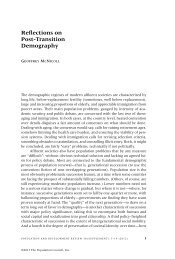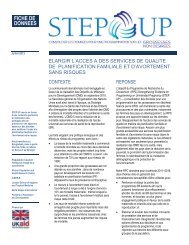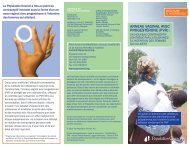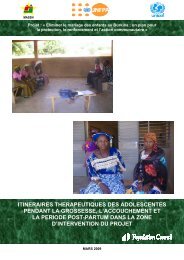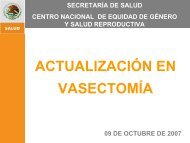Community Health Volunteer's Training Manual - Population Council
Community Health Volunteer's Training Manual - Population Council
Community Health Volunteer's Training Manual - Population Council
You also want an ePaper? Increase the reach of your titles
YUMPU automatically turns print PDFs into web optimized ePapers that Google loves.
Module 1 The CHPS Concept<br />
Topic 3 Interpersonal skills and qualities<br />
42<br />
In order to work with these groups, you the volunteer need some basic skills and qualities.<br />
Think about people you really like. What do you like about them? These are discussed in<br />
Exercise 1.3.4 and Box 1.3.3.<br />
Exercise 1.3.4 Group work<br />
Objective<br />
1. To discuss skills that makes a<br />
volunteer effective<br />
Time: 10 minutes<br />
Questions<br />
1. What interpersonal skills and<br />
qualities must a volunteer possess to<br />
be effective?<br />
2. Why must you have these skills as a<br />
health volunteer?<br />
Box 1.3.3: Good Interpersonal skills<br />
1. Respect for others<br />
2. Accept everyone as they are<br />
3. Listening and hearing<br />
4. Telling the truth or being transparent<br />
5. Networking or keeping in touch with people<br />
6. Being a team player<br />
Instructions to the Facilitator<br />
1. Lead participants to discuss good<br />
interpersonal skills<br />
2. Compare the answers with those<br />
suggested in Box 1.3.3<br />
Let us now discuss each of these interpersonal skills in some more detail.<br />
Accepting people for what they are<br />
One important skill you need to acquire is to accept everyone as they are. Respect them<br />
for their looks and their personality or behaviour. If I know that even though I am very<br />
disorganised and talkative, you respect me and listen to what I have to say, I feel secure and<br />
accepted. If you do not judge me or force me to change to suit you, I will call you my friend,<br />
and listen to and relate to you on an equal basis.<br />
Sometimes we already have an opinion about a person or situation. So we come into the<br />
relationship with our own ideas about what should be said or what should be the right<br />
answer to every situation.<br />
Relating well with your health stakeholders requires that you view each person –professional<br />
or community members – as equals who have a service, talent, idea, or something to offer.



